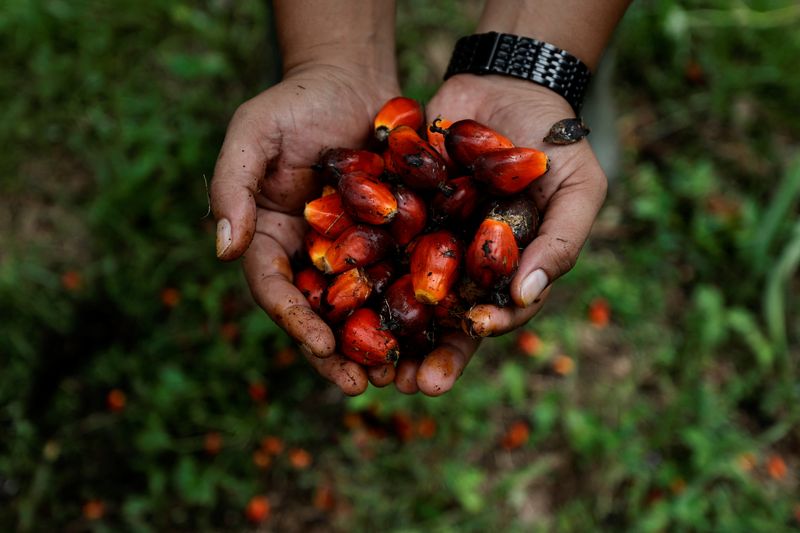By Rajendra Jadhav and Mei Mei Chu
MUMBAI/KUALA LUMPUR (Reuters) - Indonesia's "unpredictable" palm oil export policies may help Malaysia emerge as the dominant supplier to India, the world's top buyer of the edible oil, industry sources said.
Indonesia is the world's biggest palm oil producer but its erratic export policies, including the most recent ban announced on April 22, have pushed Indian consumers to increase their dependence on Malaysia, the world's second-largest producer whose output is less than half of its rival.
Malaysia is positioning itself to take advantage of Indonesia's ban by cutting palm oil export taxes by as much as half, Malaysia's Commodities Minister Zuraida Kamaruddin said on Tuesday.
The combination of lower export taxes and the Indonesian ban may mean Indonesia's share of palm oil exports to India will fall to 35% in the current marketing year ending on Oct. 31, from more than 75% a decade ago, according to an estimate from the Solvent Extractors' Association of India (SEA), a vegetable oil trade body.
"Malaysia is the biggest beneficiary from Indonesia's unpredictable policies," said B.V. Mehta, executive director of Mumbai-based Solvent Extractors' Association of India (SEA), a vegetable oil trade body.
"As Indonesia is not in the market, Malaysia is selling more, and at near record high prices."
India's palm oil imports from top suppliers https://fingfx.thomsonreuters.com/gfx/ce/zdpxogzqrvx/IndiaPalmImportsfromTopSuppliersMay2022.png
In the first five months of the 2021/22 marketing year, India has bought 1.47 million tonnes of Malaysian palm oil compared to 982,123 from Indonesia, data compiled by SEA showed.
Trader estimates for May show India imported around 570,000 tonnes of palm oil, with 290,000 from Malaysia and 240,000 from Indonesia.
If Indonesia's export ban stays in place for two more weeks, then India's June palm oil imports could fall to 350,000 tonnes, mostly from Malaysia.
NEW NORMAL?
The flip in Indian palm oil imports would upend an established pattern of Indonesian dominance across South Asia.
However, Indian oil refiners feel they have to protect their supply chains against policy shake-ups after Indonesia's interventions in the palm oil market since 2021.
"You can't just rely on Indonesia and run a business. Even if Indonesia offers you a discount over Malaysia, one has to secure supplies from Malaysia to hedge against Indonesia's unpredictable polices," a Mumbai-based refiner said.
"Refiners commit sales of finished goods in advance and we cannot back out just because raw material is not available," he said.
But, Malaysia's relatively tight palm oil inventories are a lingering concern following an enduring labour shortage that has slashed plantation yields.
"Malaysia has limited stocks. Many producers in Malaysia are well-sold nearby," said an official with a Malaysian planter with operations across Indonesia and Malaysia.
Malaysia produces roughly 40% of Indonesia's output so it cannot completely replace Indonesian supplies.

Even so, Indian oil consumers are keen to increase Malaysian deals and reduce their reliance on Indonesia.
"Indonesia may lift the ban on exports sometime this month, but there is no guarantee it will not restrict exports again. Malaysia's export policy is far more stable and that's what we want," said an Indian buyer, who declined to be named.